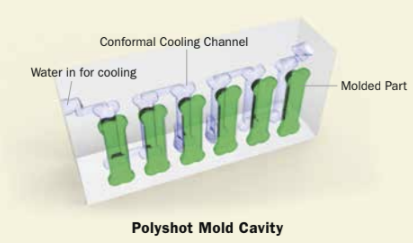Injection Mold Temperature Controllers: Optimizing the Plastic Molding Process for Quality and Consistency
Maintaining precise temperature control in the injection molding process is crucial for ensuring end product quality and repeatability. That’s especially true for many of today’s more complex molded plastic parts, which tend to demand close tolerances and specific surface finishes. Variances in temperature during the molding process can easily throw these requirements out of specification when precision is needed. That’s where mold temperature controllers come in.
The Basic Role of a Mold Temperature Controller: How It Works
As the name suggests, mold temperature control (MTC) systems continuously regulate the temperature of the injection mold. Typically, MTCs function by circulating water or oil through channels in or around the mold, functioning as a heat transfer medium.
Basically, the MTC system draws excess heat out of the mold to maintain the desired temperature and thus the desired physical/mechanical properties of the plastic. Advanced MTCs can be equipped with precise sensors, integrated heaters, and advanced cooling units to provide even more precise temperature management throughout the molding cycle. Smart systems automate the process, and provide easy computer control of temperature.
Injection Mold Temperature Control Systems Further Explained
MTCs are crucial for effectively working with the many different plastic materials common in today’s injection molded products. Different thermoplastics and thermosetting plastics have specific temperature requirements for optimal flow, curing, and solidification. MTCs ensure these requirements are consistently met, thus ensuring better quality and repeatability for your end products.
Regardless of material, uniform temperature distribution minimizes defects such as warping, sink marks, and internal stresses. The result is higher quality finished products with a higher degree of repeatability.
Proper temperature control can also significantly reduce cycle times by ensuring rapid cooling or consistent heating. Essentially, MTCs help you optimize your production process to achieve leaner manufacturing along with higher capacity. Furthermore, by optimizing heating and cooling cycles, MTCs contribute to reduced energy consumption, making the injection molding process more sustainable.
The Basic Advantages of Mold Temperature Controllers:
- Precision Plastic Products – Many precision-focused industries such as automotive parts, medical devices, industrial equipment, and electronics rely on MTCs to meet tight tolerances and intricate design requirements.
- Improving End Product Durability – Carefully maintaining injection mold temperatures facilitates better structural integrity of molded parts after they cool. That means stronger and/or more reliable parts and the potential for further design optimization.
- Consistency and Repeatability – MTCs help facilitate a repeatable production process by maintaining stable mold temperatures, ensuring all parts receive the same heating and cooling cycles. That promotes consistent part strength and quality while reducing manufacturing defects – especially essential for high-volume manufacturing.
- Reduced Waste and Scrap Rates – Less manufacturing defects means less wasted materials and scrap parts. An effective MTC system can help reduce your production costs, and also establish better sustainability for your operation.
Quality Injection Molding Solutions Since 1989
Polyshot Corporation specializes in the development of advanced hot runner systems to injection molding companies worldwide. Backed by more than 35 years of innovation and experience, our company continues to help our customers remain at the cutting edge of industry.


